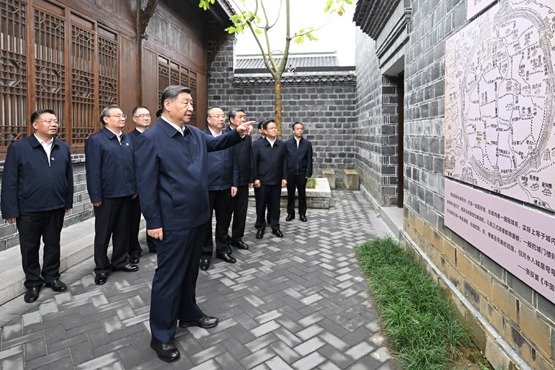Nobel laureates laud humanitarian role of life sciences at Hainan conference


Life sciences are a collective endeavor for humanity, said Wu Weihua, academician of the Chinese Academy of Sciences and chairman of the Central Committee of the Jiusan Society, at the 2024 World Life Sciences Conference, which runs from Saturday to Monday in Boao, Hainan province.
He emphasized that scientists from various countries should enhance their sense of a shared destiny, establish multi-level, wide-ranging, and institutionalized communication platforms, and collaborate through concrete actions to elevate the overall development of life science research.
George Fitzgerald Smoot III, 2006 Nobel laureate in physics, said that his current research aligns closely with the theme of the conference - One World, One Health.
Now he is involved in integrating advanced physics technology into healthcare and medical devices. His projects encompass cutting-edge applications of artificial intelligence in medicine, remote diagnostics, and the adaptation of space-based medical innovations originally created for NASA for use on Earth.
Furthermore, Smoot highlighted his team's endeavors in carbon purification technology, presenting a promising solution for combating environmental pollutants and allergens, contributing to enhancing the health of our shared environment.
Randy W. Schekman from the University of California, Berkeley, 2013 Nobel laureate in physiology or medicine, emphasized the critical importance of life sciences research. He said that the theme of the conference underscores the pressing need to address global health challenges amid a backdrop of diverse and complex issues such as major diseases, population aging, environmental pollution, climate change, and resource scarcity.
He said his career has been dedicated to fundamental, curiosity-driven research as a catalyst for scientific advancement. His exploration of vesicle trafficking mechanisms in simple yeast cells has revealed the profound impact of evolution as a unifying principle, shedding light on the vast diversity of life on Earth and potentially beyond.
"It is through such foundational work that we gain a deeper understanding of more complex biological processes and lay the groundwork for advancements in medicine and biotechnology," he added.
Luo Qingming, president of Hainan University, said that the university houses nine schools dedicated to life sciences, with an annual enrollment exceeding 2,000 undergraduate students and over 1,700 graduate students. As co-organizers of the conference, the university has orchestrated the attendance of more than 500 teachers and students at the event. Additionally, the university has mobilized a team of over 200 volunteers to support the smooth running of the conference.
"This conference serves as a platform for fostering meaningful exchanges between our faculty, students, and renowned scholars. By actively participating in the event, Hainan University aims to bolster the development of life sciences and related disciplines within the university, envisioning a future where such engagements play a pivotal role in advancing academic and research pursuits," Luo said.
- Nobel laureates laud humanitarian role of life sciences at Hainan conference
- Shanghai International Nature Conversation Festival kicks off to promote green life
- Oil tea cultivation benefiting Guizhou farmers
- CPC plenary session discusses development challenges, opportunities in Jilin
- China displays samples retrieved from moon's far side in Italy
- 40% girls aged 13-14 benefit from free HPV vaccination program




































